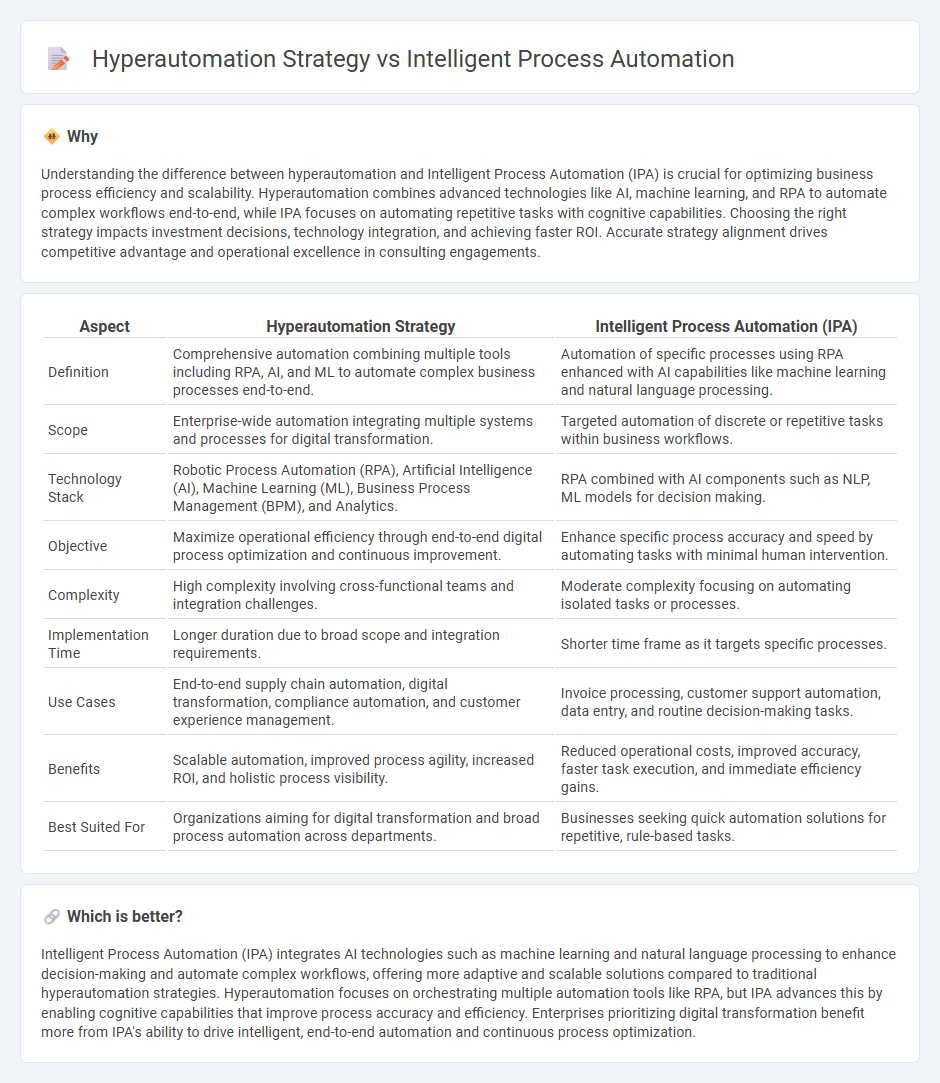
Hyperautomation strategy integrates advanced technologies such as AI, machine learning, and robotic process automation to automate complex business processes end-to-end, driving significant operational efficiency and scalability. Intelligent Process Automation focuses on automating specific tasks using AI-powered tools for decision-making and process enhancement but may not cover the entire automation lifecycle. Explore the differences and benefits of these approaches to optimize your enterprise automation journey.
Why it is important
Understanding the difference between hyperautomation and Intelligent Process Automation (IPA) is crucial for optimizing business process efficiency and scalability. Hyperautomation combines advanced technologies like AI, machine learning, and RPA to automate complex workflows end-to-end, while IPA focuses on automating repetitive tasks with cognitive capabilities. Choosing the right strategy impacts investment decisions, technology integration, and achieving faster ROI. Accurate strategy alignment drives competitive advantage and operational excellence in consulting engagements.
Comparison Table
| Aspect | Hyperautomation Strategy | Intelligent Process Automation (IPA) |
|---|---|---|
| Definition | Comprehensive automation combining multiple tools including RPA, AI, and ML to automate complex business processes end-to-end. | Automation of specific processes using RPA enhanced with AI capabilities like machine learning and natural language processing. |
| Scope | Enterprise-wide automation integrating multiple systems and processes for digital transformation. | Targeted automation of discrete or repetitive tasks within business workflows. |
| Technology Stack | Robotic Process Automation (RPA), Artificial Intelligence (AI), Machine Learning (ML), Business Process Management (BPM), and Analytics. | RPA combined with AI components such as NLP, ML models for decision making. |
| Objective | Maximize operational efficiency through end-to-end digital process optimization and continuous improvement. | Enhance specific process accuracy and speed by automating tasks with minimal human intervention. |
| Complexity | High complexity involving cross-functional teams and integration challenges. | Moderate complexity focusing on automating isolated tasks or processes. |
| Implementation Time | Longer duration due to broad scope and integration requirements. | Shorter time frame as it targets specific processes. |
| Use Cases | End-to-end supply chain automation, digital transformation, compliance automation, and customer experience management. | Invoice processing, customer support automation, data entry, and routine decision-making tasks. |
| Benefits | Scalable automation, improved process agility, increased ROI, and holistic process visibility. | Reduced operational costs, improved accuracy, faster task execution, and immediate efficiency gains. |
| Best Suited For | Organizations aiming for digital transformation and broad process automation across departments. | Businesses seeking quick automation solutions for repetitive, rule-based tasks. |
Which is better?
Intelligent Process Automation (IPA) integrates AI technologies such as machine learning and natural language processing to enhance decision-making and automate complex workflows, offering more adaptive and scalable solutions compared to traditional hyperautomation strategies. Hyperautomation focuses on orchestrating multiple automation tools like RPA, but IPA advances this by enabling cognitive capabilities that improve process accuracy and efficiency. Enterprises prioritizing digital transformation benefit more from IPA's ability to drive intelligent, end-to-end automation and continuous process optimization.
Connection
Hyperautomation strategy integrates Intelligent Process Automation (IPA) to streamline complex business workflows by combining AI, machine learning, and robotic process automation. IPA enhances hyperautomation by enabling smarter, adaptive automation of repetitive and decision-based tasks, driving efficiency and reducing operational costs. The synergy between hyperautomation and IPA accelerates digital transformation, delivering scalable and agile process optimization across enterprises.
Key Terms
Artificial Intelligence (AI)
Intelligent Process Automation (IPA) integrates AI technologies such as machine learning and natural language processing to enhance specific business processes through automation. Hyperautomation expands on IPA by combining multiple advanced tools including AI, robotic process automation (RPA), and analytics to automate complex workflows at an enterprise scale. Explore how leveraging AI-driven automation strategies can revolutionize operational efficiency in your organization.
Robotic Process Automation (RPA)
Intelligent Process Automation (IPA) integrates Artificial Intelligence (AI) with automation to enhance Robotic Process Automation (RPA) by enabling the handling of unstructured data and complex decision-making. Hyperautomation expands IPA by combining multiple automation tools, including RPA, AI, machine learning, and process mining, to automate end-to-end business processes at scale. Explore in-depth comparisons and strategic benefits of IPA and hyperautomation to optimize your organization's automation journey.
End-to-end Workflow Orchestration
Intelligent Process Automation (IPA) enhances specific tasks using AI and machine learning, streamlining individual processes within a broader system. Hyperautomation strategy extends beyond IPA by integrating multiple automation technologies to achieve end-to-end workflow orchestration across entire business operations. Explore how adopting hyperautomation transforms operational efficiency and drives comprehensive digital transformation.
Source and External Links
What is intelligent process automation? - Intelligent Process Automation (IPA) combines robotic process automation (RPA) with AI, process mining, OCR, analytics, and machine learning to create business automation that thinks, learns, and adapts autonomously, enabling end-to-end process transformation and innovation.
What Is Intelligent Process Automation? - IPA integrates AI and machine learning with traditional automation to enhance operational efficiency, accuracy, and customer experience by automating complex business processes across HR, finance, IT, and supply chains.
Intelligent process automation: The engine at the core of ... - Intelligent Process Automation is a suite of technologies combining process redesign, robotic process automation, and machine learning to remove repetitive tasks, augment decision-making, increase efficiency, and improve customer journeys through continuous learning.
 dowidth.com
dowidth.com